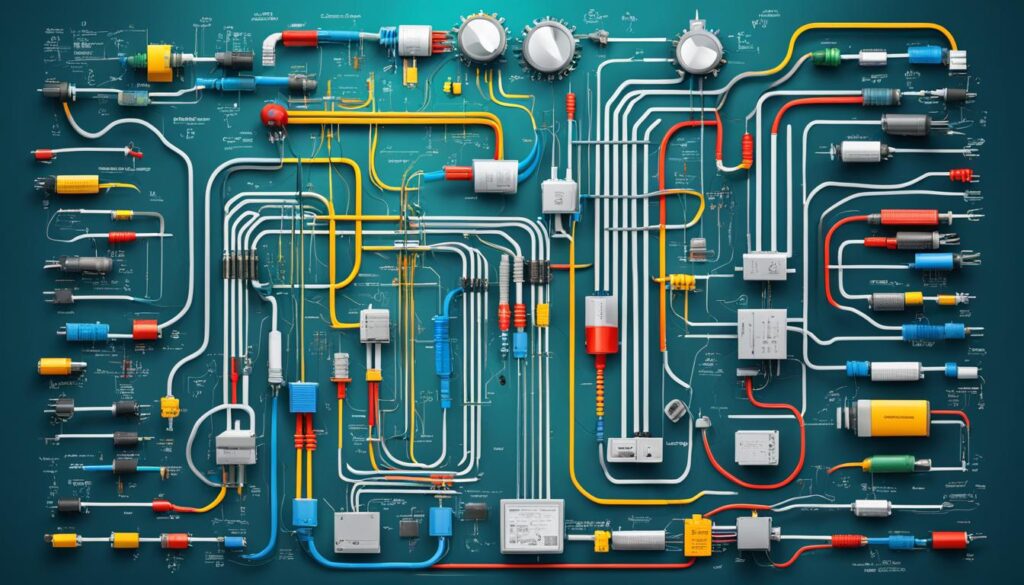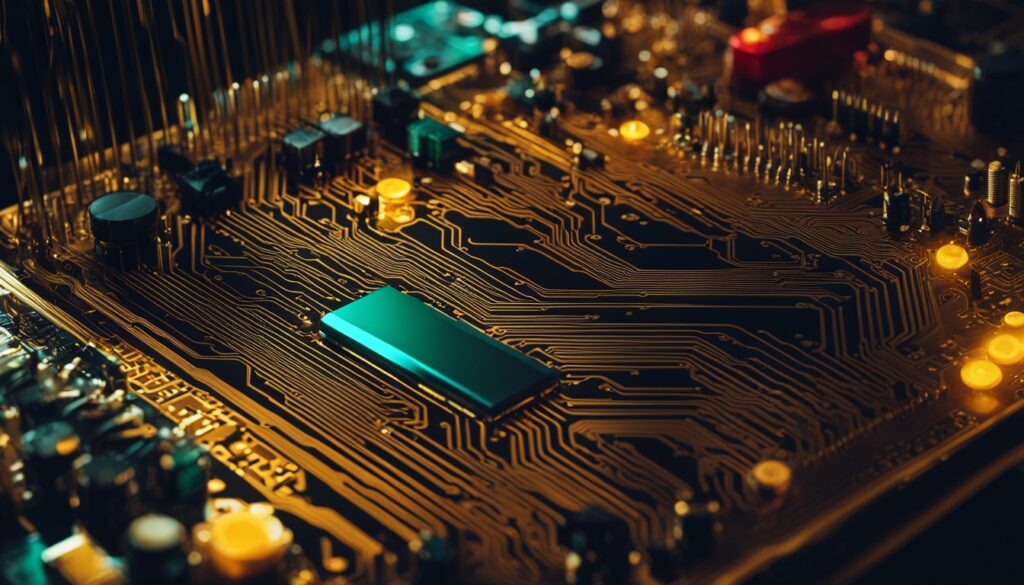What Are Electrical Engineering Principles?
Engineering is challenging yet fascinating. It drives development in many fields. While electrical engineering encompasses everything from basic principles to complex systems, expert witnesses in this field shed light into legal cases with their specialized knowledge.
Principles such as electrical quantities and applications are at the heart of electrical engineering. They help us understand and create electrical systems. Electrical engineer expert witnesses are essential in legal cases about electrical systems. Hire an electrical engineer expert witness to get technical analysis and support.

Key Takeaways
- Electrical engineering is the study and application of electromagnetism principles.
- Electrical engineering principles cover a wide range of topics, from electrical quantities to magnetism and AC theory.
- Electrical engineer expert witnesses have specialized knowledge in electrical systems, codes, and safety requirements.
- Electrical engineer expert witnesses provide crucial insights and evidence in legal cases related to electrical systems.
- Understanding core electrical engineering principles is essential for both students and professionals in the field.
Introduction to Electrical Engineering
Engineering is a fascinating and challenging field that attracts creative minds. It has always drawn those with the ability to innovate and improve life. Engineers work hard to push forward different sectors in our ever-changing world. If you dream of making a big impact through revolutionary products, consider electrical engineering.
The Fascinating Discipline of Engineering
Engineering has shaped our world in many ways. Electrical engineers, for example, help design microchips and build power station generators. Important names like Thomas Edison and Nikola Tesla have greatly influenced electrical engineering’s progress.
Core Electrical Engineering Principles
The study of electrical engineering involves many areas. It includes dealing with electrical quantities and their applications. There’s also the understanding of cells and batteries. This is crucial as they power many of our devices. Then, there are electrical instruments for measuring different aspects of electricity. Understanding these is key to successful measurements and system checks. Furthermore, one learns about DC circuit theory and its basic components. This knowledge is the backbone of designing power supply systems and other devices.
Electrical Quantities and Applications
Electrical engineering is all about current, voltage, resistance, and power. Ohm’s Law and other rules help explain how they work together. This knowledge is vital for designing electrical systems and applications.
Cells and Batteries
We also study electrochemistry to understand how batteries work. Knowing about different battery types and their features is important for engineers.
Electrical Instruments and Measurements
Using tools like voltmeters and ammeters is common for electrical engineers. It’s essential to know how to use them accurately. This understanding ensures proper measurement and system checks.
DC Circuit Theory
DC circuit theory, with laws and different circuit types, is a key part of the field. It helps in designing and analyzing electronic devices and power systems.
Magnetism and Electromagnetism
We learn about magnetism and how it interacts with electricity. This is vital for designing electrical machinery and systems.
Electrostatics
Understanding static electric charges is important for designing safe electrical equipment. It’s key in preventing events like lightning.
AC Theory
AC theory is crucial for understanding systems that change over time. It’s at the heart of designing power systems and electric devices.
Single Phase Transformers
Transformers are central to electrical power systems. Knowledge of how they work is vital for their design and maintenance.
In electrical engineering, grasping these fundamentals is crucial for students and professionals. They provide the base for working with a variety of electrical systems and devices. Mixing theory with real-world practice, electrical engineers help advance many fields. This includes power distribution, electronics, and industrial automation.

Role of an electrical engineer expert witness
Electrical engineer expert witnesses dive deep into technical details and explain them for legal cases. They cover topics like forensic electrical engineering and accident reconstructions. This expert knowledge helps in making fair, evidence-based decisions in court.
Their skills include electrical safety analysis and code compliance checks. They also look into why power systems fail and help figure out if electrical products are safe. All of this is key in offering clear, professional opinions in law.
Forensic Electrical Engineering
Forensic electrical engineering applies engineering expertise to legal matters involving electrical failures and accidents. These engineers analyze fires, electrocutions, or equipment malfunctions to determine the cause.
Electrical Accident Reconstruction
Electrical accident reconstruction investigates electrical accidents to pinpoint the cause. It’s like detective work for electrical mishaps. By analyzing the scene, witness accounts, and electrical components, experts can determine what went wrong. This knowledge is vital for preventing future accidents, assigning liability, and ensuring electrical systems function safely.
Electrical Code Compliance Analysis
An Electrical Code Compliance Analysis examines a building’s electrical system to ensure it aligns with safety standards set by the National Electrical Code (NEC) or local regulations. An electrical engineer helps everyone understand the technical information in civil cases. By identifying areas that don’t meet the code, electrical hazards like fires and shocks can be prevented. Additionally, compliance is mandated by law, and failure to meet code can result in fines or even halt construction.
Electrical Fire Investigation
Electrical fire investigation is akin to solving a fire-based whodunit. Investigators examine the scene for clues – burn patterns, witness accounts, and electrical components – to pinpoint the exact electrical malfunction that sparked the fire. This meticulous process helps identify issues like faulty wiring, overloaded circuits, or improper connections.
Electrical Safety Analysis
Expertise, communication skills, and knowledge of law are examined for expert witness qualification. It’s vital for these witnesses to understand legal terms. This way, their insights are correctly considered by the court.
Power System Failure Analysis
Expert electrical engineers are vital for many cases. They offer guidance in both crime and civil law. Their broad understanding of electrical engineering is needed to make informed legal decisions.
Electrical Product Liability Assessment
An Electrical Product Liability Assessment evaluates whether a malfunctioning electrical product caused injury or property damage. This assessment analyzes the product itself, investigating for design flaws, manufacturing defects, or inadequate warnings.
Arc Flash Hazard Assessment
It meticulously analyzes electrical systems to determine the potential severity of an arc flash incident. This assessment calculates the amount of energy that could be released during an arc flash and identifies the boundaries of danger zones. This helps workers understand what Personal Protective Equipment (PPE) they need for the job.
Electrical System Design Review
It involves experienced engineers meticulously examining blueprints and calculations to ensure everything adheres to safety codes and meets project needs. This review focuses on critical areas like power distribution, capacity, and grounding.
Keeping calm and self-assurance are crucial for expert witnesses. They deal with various law matters that involve faults in electrical devices and systems. Their input aids in uncovering the facts in legal cases.
The Varied World of Electrical Engineering: From Powering the Future to Uncovering Facts in Courtrooms
Electrical engineering is full of variety and challenges. It covers everything from basic electrical concepts to magnetism, electromagnetism, and AC theory. This knowledge is key for students and professionals alike. Also, the help of expert witnesses in electrical engineering is very important. They assist with analyzing and explaining technical aspects in legal cases about electrical systems, codes, and accidents.
Leading the way in electrical engineering expertise for legal matters are individuals like Mark McFarland, P.E. He possesses not only the necessary high levels of education, but also a proven track record of success. His ability to translate complex technical topics into clear and concise explanations is critical in court.
Mr. McFarland exemplifies this perfectly. A Licensed Professional Electrical Engineer with a combined 25+ years of experience in electrical, telecommunications, and applied research, he boasts a Master’s degree in both Telecommunications and Engineering Management, solidifying his grasp of the field. Furthermore, his published works and presentations at national and international conferences demonstrate his ongoing commitment to the industry’s advancements.
Currently, Mr. McFarland serves as both the CEO of Discovery Engineering and a researcher at the US Department of Commerce, showcasing his well-rounded expertise. This blend of broad knowledge and specialized skills, encompassing areas like power systems and fire investigation, empowers him to shed light on evidence and provide fair, objective views in court. Top qualities in your electrical engineer expert witnesses ensure the evidence in legal cases is precise and trustworthy.
FAQ
What are the core principles of electrical engineering?
Electrical engineering principles include many areas. These cover items like electrical quantities, cells and batteries, and DC circuit theory. Topics also involve magnetism, AC theory, and transformer theory.
What is the role of an electrical engineer expert witness?
Electrical engineer expert witnesses give detailed technical analysis in court cases. They focus on electrical systems, code issues, and accident rebuilding. Their deep knowledge is essential for offering clear, factual opinions in legal matters.
What are the benefits of pursuing a career in electrical engineering?
Engineering is a compelling field, always pushing towards new developments. And electrical engineering stands at the forefront of innovation. If you’re up for the challenge and keen to make a difference, this field is for you.